AI is changing how e-commerce brands operate. The AI tools for e-commerce available now are smarter and easier to use than ever before. The e-commerce sector's adoption of AI is projected to have a CAGR of 24.34% until 2034, with a total market volume of $64.03 billion. In fact, over 50% of e-commerce brands have already been using AI tools.
If you're running an online store, managing a product catalog, or scaling customer support, then using AI tools in your processes has become essential to stay ahead in the competitive space.
In this guide, we will learn how AI tools help ecommerce and digital marketing leaders improve personalization, customer retention, and streamline operations. We guide you through the top AI tools for e-commerce in 2025 and show how Dragonfly AI's attention-tracking and visual analysis enhance conversion and engagement when combined with these tools.
What Are AI Tools for E‑Commerce?
AI tools for e‑commerce are software systems that use machine learning and data analysis to process large amounts of data, find patterns, and make decisions based on those patterns. Unlike traditional software, they do not just follow fixed instructions. They improve and adjust as they work with more data.
These tools often rely on advanced technologies such as machine learning for ecommerce and deep data analytics to continuously adapt and improve performance across sales funnels.
AI studies customer behavior, such as browsing history and past purchases, to offer better recommendations, more relevant search results, and personalized shopping experiences. These tools also take over time‑consuming work like customer support and supply chain management. This reduces manual effort and helps businesses respond faster and more consistently.
Top AI Tools for E-Commerce in 2025: A Deep Dive into Key Categories
AI is now at the core of how e-commerce works. The market is growing fast, with tools built for key areas like personalization, pricing, and logistics.
The following tools span multiple categories, and many of them leverage predictive analytics in ecommerce to guide decisions and improve ROI.
.png?width=1280&height=700&name=Blog%20image%2012%20(5).png)
Now, let's discuss each tool in detail by category.
Personalization Engines: Crafting Unique Customer Journeys
Personalization is now a basic expectation for any online shopper. AI-based personalization engines lead the way in creating these customized experiences.
Nosto
.png?width=1280&height=700&name=Blog%20image%2015%20(5).png)
Nosto is a commerce experience platform that uses AI to create highly personalized commerce experiences. It integrates four AI technologies including predictive AI, semantic AI, visual AI, and generative AI.
Nosto uses these AI technologies to adjust recommendations, search results, and content across channels like emails and pop-ups based on real-time customer behavior and transactional data. It helps increase conversion rates by showing the products that customers are most likely to purchase.
Best Features
- On-site product recommendations based on real-time customer behavior
- On-site content personalization for web store elements like navigation bars, banners, videos, copy, and graphics
- Advanced segmentation and insights to understand customers and create targeted segments
- Seamless integration with major e-commerce platforms like Shopify and Magento
Pricing: Custom pricing
Ratings: 4.6 out of 5 based on 235 G2 reviews
Dynamic Yield
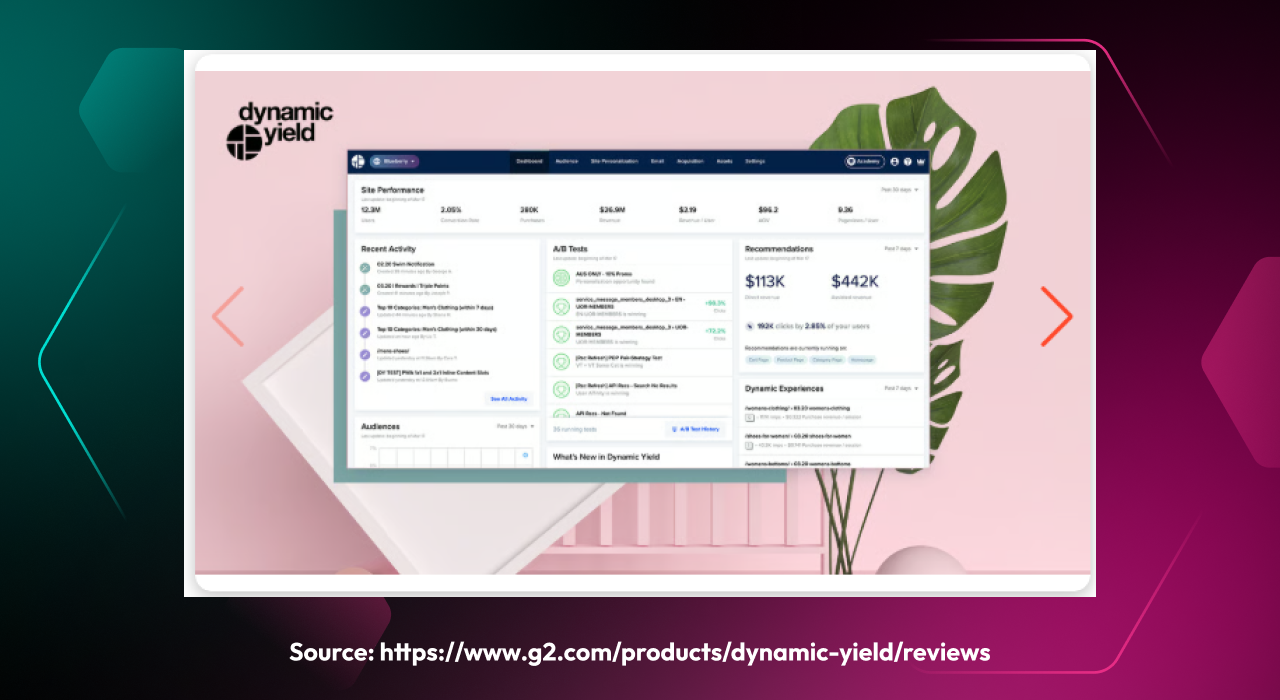
Dynamic Yield, owned by Mastercard, is an AI-based system that personalizes content, products, and offers for each customer. Its AI feature predicts how customers will act in the future across websites, phones, emails, and apps.
Best Features
- Detailed segmentation and precise targeting
- Integrated A/B testing of different experiences to maximize conversions
- Real-time ecommerce optimisation
- Smooth omnichannel experience
- Strong analytics for data-driven decisions
Pricing: Custom pricing. But the mid-market price is 11% lower than the average Personalization Engines product, while the enterprise price is 23% higher.
Ratings: 4.5 out of 5 stars based on G2 reviews
AI Chatbots & Virtual Assistants: 24/7 Customer Engagement
AI chatbots and virtual assistants are changing customer service from a cost center into a strategic asset. They offer quick support to customers and can even help drive sales.
Tidio Lyro
.png?width=1280&height=700&name=Blog%20image%2016%20(3).png)
Tidio Lyro is an AI-powered customer service platform to automate customer support and engage customers in real-time. Its special AI agent, Lyro, can answer most customer questions, which helps respond faster and allows staff to focus on more complex issues.
Best Features
- Easy-to-use chat solution
- AI-driven personalisation with multiplatform and multilingual support
- Product recommendations based on Shopify inventory, context, price, or season
- Automate the routine tasks for emxapel, checking order statuses, and creating tickets
- Real-time customer engagement via live chat and chatbots
- Seamless integrations with e-commerce platforms, CMS, and social media
- Improve customer satisfaction with 24/7 AI support and human-like interactions
Pricing: Lyro AI Agent starts at $39/month for 50 conversations, scalable by volume. Pair it with the Tidio customer service suite, and the Starter plan costs $24.17 a month for 100 billable conversations. Growth plan is $49.17/month for up to 2,000 billable conversations. The Plus plan starts at $749/month, and the Premium plan offers managed service and a guaranteed 50% AI resolution rate, from 5,000 Lyro AI conversations.
Ratings: 4.7/5 star rating based on G2 reviews
Predictive Analytics & Conversion Rate Optimization (CRO): Boosting Sales Smarter
Predictive analytics and CRO tools analyze data and help businesses make changes before problems happen. This led to higher conversion rates and revenue.
Optimizely
.png?width=1280&height=700&name=Blog%20image%2017%20(1).png)
Optimizely is a Digital Experience Platform (DXP) that helps businesses create digital content quickly and personalize experiences for users. It also allows companies to test different options to see what works best. The system uses AI and built-in analytics to help businesses see real results from their efforts.
Best Features
- AI powered creation and campaign launches
- More intelligent product search for e-commerce
- Optimizely Opal AI for advanced automation across workflows
- Complex testing methods like A/B testing to improve website performance
- User behavior analytics to identify usability issues and conversion barriers
- Real-time insights to create personalized experiences on a large scale
Pricing: Custom plan available
Ratings: G2: 4.2 out of 5 based on 310 reviews, and Score 8.6 out of 10 on TrustRadius
Pricing Optimization: Maximizing Revenue with Dynamic Strategies
Competitive market demands change prices quickly to attract more customers and maximize profitability. AI in e-commerce enables smarter, data-driven pricing strategies that respond dynamically to market conditions.
Competera
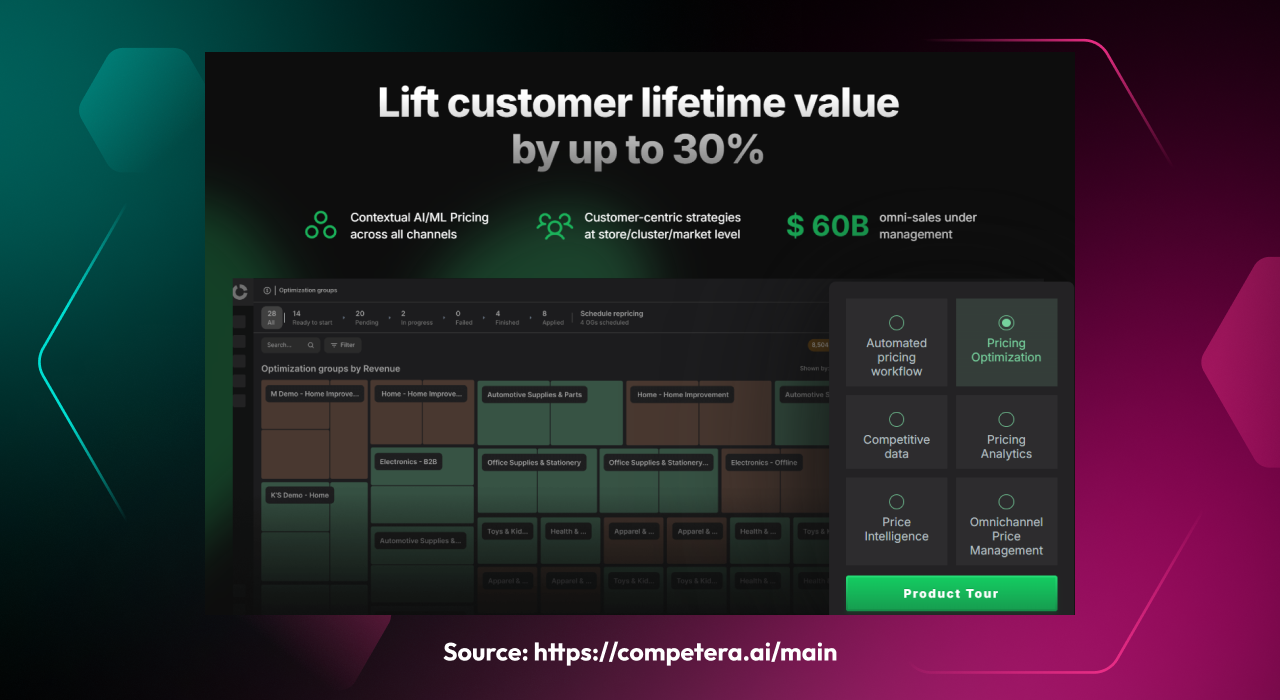
Competera uses AI to help set the best prices for each product in different stores and sales channels. It considers more than 20 different factors to make these decisions. Its AI engine is trained on large data, including over 10 billion real-world transactions, which helps it suggest highly accurate prices.
Best Features
- Live competitive monitoring
- Advanced pricing algorithms
- Precise price elasticity modeling
- "Human-in-the-loop" approach for expert guidance
- Scenario analysis with "What-if" feature to forecast impact
- Automates 97%+ pricing decisions
Pricing: Available upon request
Ratings: 4.9 out of 5 based on G2 reviews
Operations and Logistics: Streamlining the Supply Chain
E-commerce businesses are transforming their operations with AI-driven efficiencies. AI ensures smoother, more reliable supply chain performance across the board.
Cin7
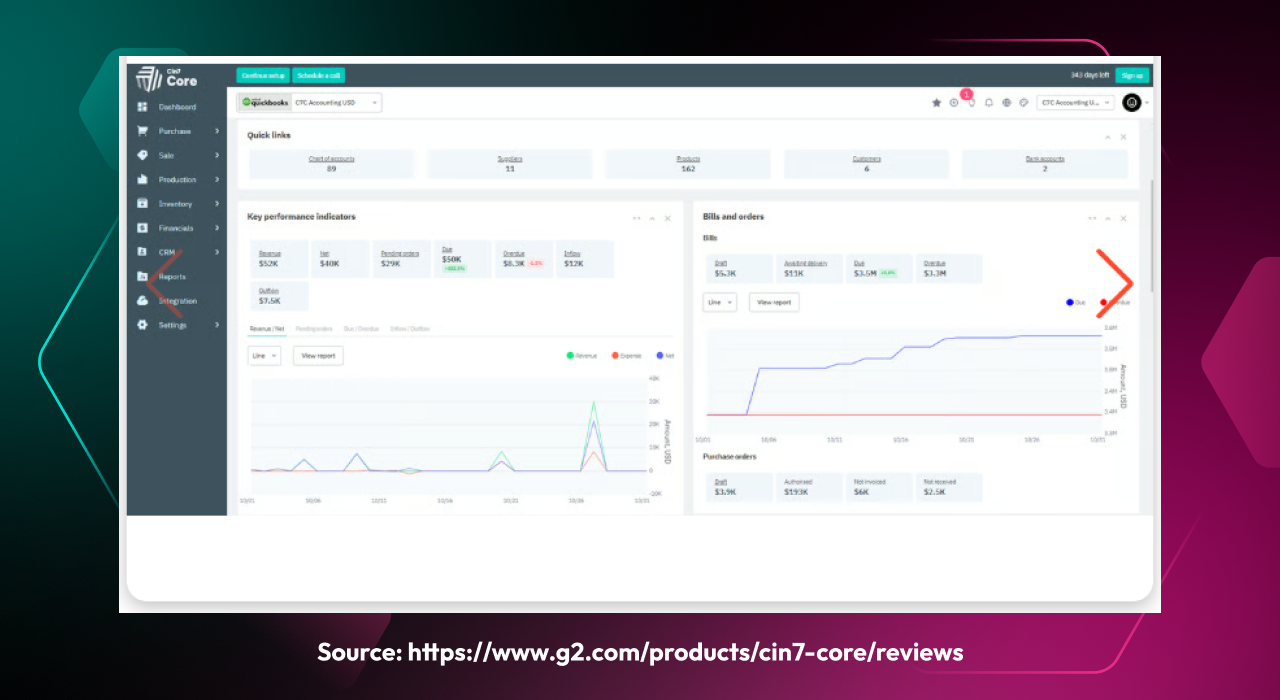
Cin7 is an inventory and order management solution offering integration with over 700 ecommerce platforms, including Shopify, Amazon, and WooCommerce. It's feature "ForesightAI" uses more than 100 algorithms to predict customer demand and market trends up to two years in advance.
Best Features
- Extensive integration with potential e-commerce platforms
- Automated order fulfillment processes (picking, packing, shipping)
- Rule-based workflows for order processing and automated replenishment
- Multi-location and multi-supplier planning
- Real-time stock visibility
Pricing: Cin7 Core offers three tiers, Standard, Pro, and Advanced. Each plan is designed to meet the needs of growing businesses, with increasing features and scalability. Pricing starts at $349/month.
Ratings: 4.2 out of 5 based on G2 reviews
Prediko
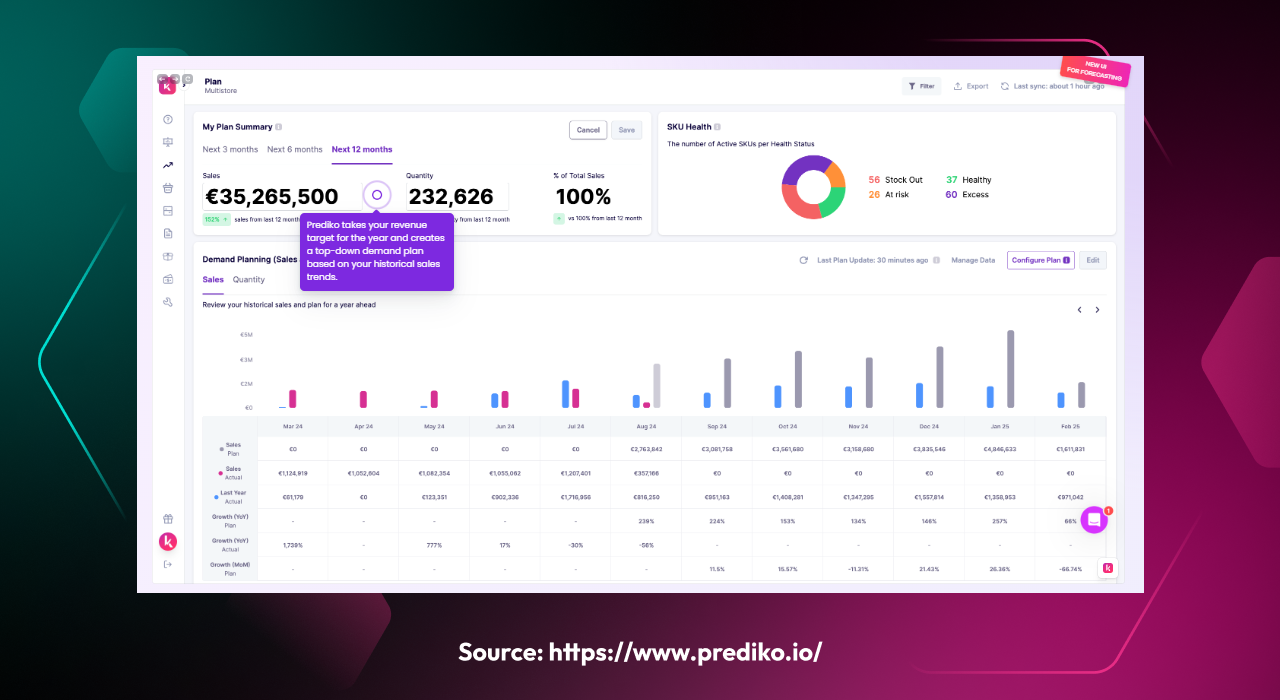
Prediko is also an AI-powered inventory management tool to help Shopify brands manage their inventory and predict sales. It provides highly accurate AI-powered sales forecasting at granular levels (SKU, product, category, and even store) and also helps manage purchase orders.
Best Features
- Trusted by 1000+ Shopify brands
- AI-powered sales forecasting (SKU, product, category, store levels)
- Comprehensive purchase order management system
- Real-time stock health monitoring with proactive alerts
- Inventory reports with 100+ filters for customization
- Management of complex inventory setups (multi-store, multi-warehouse, bundles, subscriptions)
Pricing: Starts at $49 per month
Ratings: 4.7 out of 5 based on G2 reviews
Dragonfly AI: Your Neuromarketing Edge in E-Commerce
Knowing what draws consumer attention can make or break a sale in e-commerce. . This is where Dragonfly AI come in handy. Dragonfly AI helps you understand and optimize exactly what attracts, engages, and converts your shoppers. Here are the key benefits of using Dragonfly AI:
- Visual Attention Prediction: Instantly see which areas of your ecommerce assets grab the most attention with predictive heat maps. These insights help you place your most important information exactly where customers will see it first. .
- Real-Time Performance Benchmarks: Compare your creative assets against industry leaders and your own best-performers. Get actionable insights into what’s working (or not) and continuously optimize for maximum ROI.
- A/B Testing at Scale: Quickly compare up to 50 creative assets using predictive modeling to identify the strongest visual performer before launch.See which visuals convert best, supported by science.
- Scientific Validation: Dragonfly AI is powered by a patented algorithm rooted in human visual processing. It delivers insights that are proven to influence real-world shopper decisions, regardless of market or region.
- Actionable Neuromarketing: Dragonfly AI transforms deep neuroscience and consumer psychology into practical, easy-to-use recommendations for your team. The platform helps you reduce bounce rates, boost conversions, and maximize every interaction, from landing pages to mobile carts.

Real-World Impact: Success Stories of Using AI in E-commerce
Major retailers are using AI to solve real business problems. They are focusing on efficiency, better customer experiences, and stronger sales performance.
Amazon: AI Assistant That Drives Revenue
Amazon has launched Rufus, a conversational AI tool that helps customers find products and get tailored recommendations using natural language. The company expects Rufus to generate over $700 million in indirect profit by the end of 2025, driven by higher customer spending. This does not include expected ad revenue from 13 global markets.
Walmart: AI Across Sales, Service, and Operations
Walmart has rolled out Sparky, a generative AI assistant available in its mobile app. Customers can use it to browse items, manage orders, and generate recipes. Walmart is also applying AI across logistics, workforce management, and seller tools. Its goal is for 50% of total sales to come from online channels within five years, supported by a unified AI system.
Other Examples
Many other companies like Nike, L'Oréal, and IKEA use AI for personalized product recommendations, virtual try-on features, and better search options. Here’s how:
- Stitch Fix: The company uses AI for personalized fashion styling, curating clothing selections tailored to individual customer preferences.
- Nike: Nike employs AI-powered virtual try-on to scan users' feet via smartphone cameras through its "Nike Fit" technology. It provides precise shoe size recommendations and significantly reduces size-related issues.
- L'Oréal Modiface: This AI-powered platform enables customers to virtually try on beauty products like lipstick and foundation, with the system suggesting flattering shades based on skin tone.
- IKEA Place: IKEA's augmented reality (AR) app allows users to visualize how furniture will look in their homes, complete with accurate dimensions. This prevents incorrect purchases and enhances customer confidence.
Small and Mid-Sized Retailers Proving AI Is Affordable and Delivers Results
A positive trend is that AI tools are becoming more accessible and affordable for small and medium-sized businesses, often through flexible subscription plans. This allows smaller companies to access advanced AI that was previously limited to larger corporations.
- World of Wonder (RuPaul's Drag Race): They successfully boosted conversions by nearly 20% across all its landing pages by implementing AI‑powered Smart Traffic tools. This led to their streaming service conversion rate climbing to an impressive 29.7%.
- Going (Travel Deals): Going.com focused on travel deals, doubled its conversion rates for its premium services using AI-powered A/B testing to refine calls-to-action (CTAs). This resulted in a 104% month-over-month increase in premium trial start rates.
How to Start Using AI in E-commerce Without Overcomplicating It
Adopting predictive analytics in e-commerce requires a strategic approach including planning, integration, ethical considerations, and continuous optimization. The table below explains the best practices for ecommerce optimization, actionable steps, and why using AI in ecommerce matters.
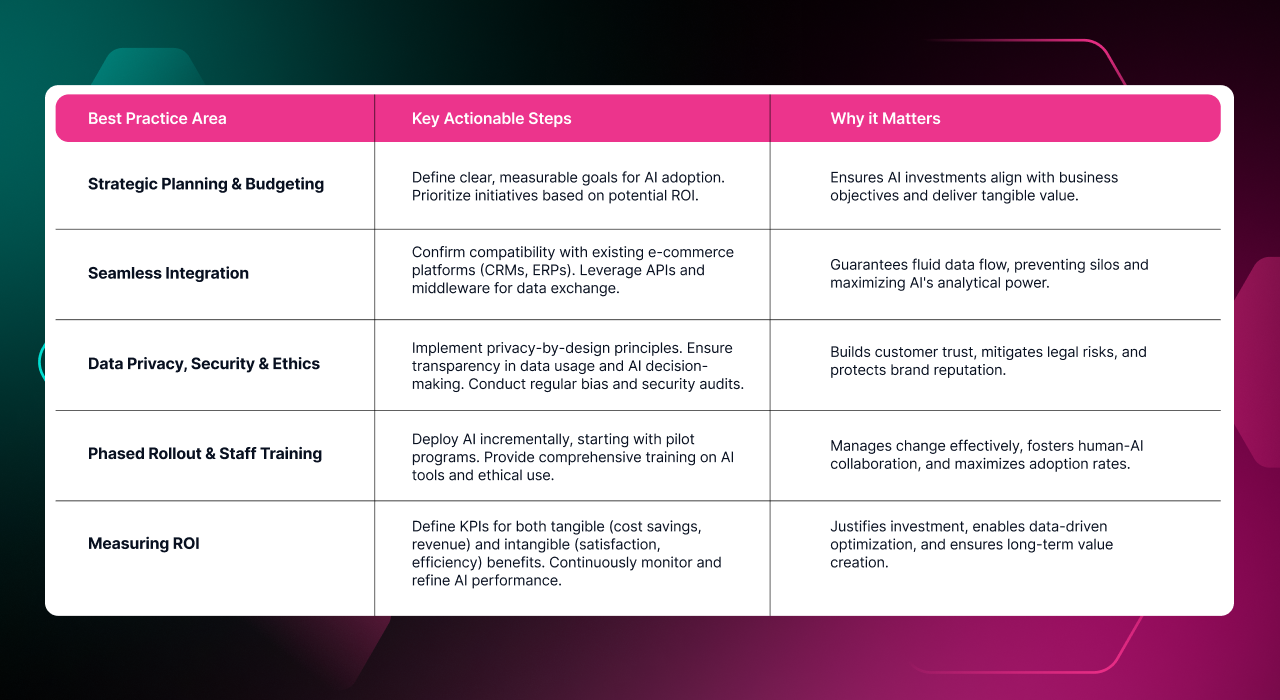
The Future of E-Commerce AI: Trends to Watch
As we look ahead, several emerging trends are shaping the future of AI in e-commerce. Some trends to watch for:
- AI-Powered Personalization Becomes the Norm: Advanced AI now analyzes browsing behavior, purchase history, and live interactions to deliver tailored content, offers, and product recommendations. This level of hyper-personalization improves engagement, raises conversion rates, and builds long-term customer loyalty.
- Generative AI Enhancing the Customer Experience: Generative AI is redefining digital interactions. Modern chatbots and virtual assistants now understand natural language, recommend products in context, and support in-app purchases. Companies like Amazon are leading this shift with conversational tools that simplify product discovery and checkout.
- Neuromarketing and Predictive Optimization: AI-powered neuromarketing is gaining traction. Visual attention models and predictive heatmaps help brands understand what content truly engages users. This shift moves marketing from guesswork to measurable cognitive response, which allows for smarter creative decisions.
- Privacy, Transparency, and Ethical AI: As AI becomes more embedded in the shopping experience, consumers expect clarity around how their data is used. Leading retailers are responding with transparent data practices, ethical AI frameworks, and strong encryption.
Your Next Move in the AI-Powered Future
The rise of AI in e-commerce is a fundamental shift in how brands attract, engage, and retain customers. From personalized recommendations and chatbots to analytics and pricing, AI tools are essential for today’s digital competition.
As neuromarketing, generative AI, and ethical innovation continue to grow and improve, the e-commerce experience will become even more intuitive, immersive, and truly focused on people.
Ready to see how AI-powered visual analysis can transform your e-commerce business? Book a demo of Dragonfly AI today and discover a new way to understand your customers.
For more insights into the future of marketing and technology, explore our blog, including our article on "The Future of eCommerce: Harnessing Neuromarketing with AI".